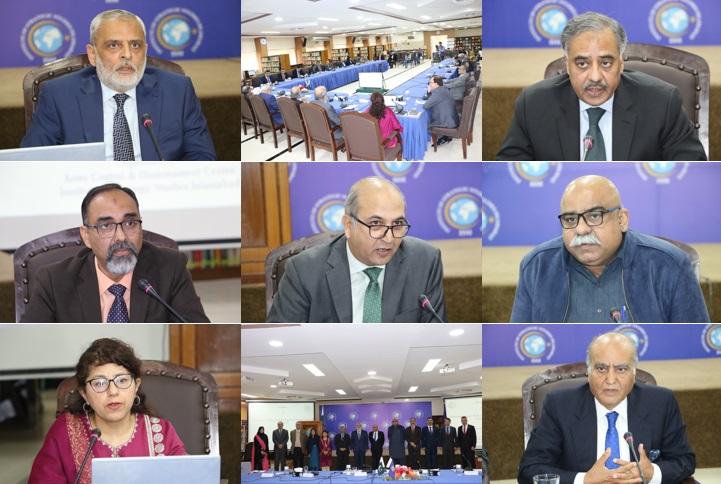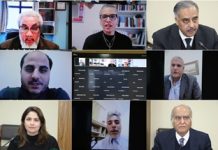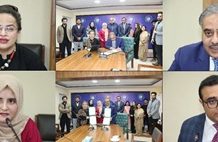Press Release
ISSI hosts Seminar on “Pakistan’s Space Policy: Tapping into the Space Potential”
February 29, 2024

The Arms Control and Disarmament Centre (ACDC) at the Institute of Strategic Studies Islamabad (ISSI) hosted a seminar entitled “Pakistan’s Space Policy: Tapping into the Space Potential” on February 29, 2024. Maj. Gen. (R) Amer Nadeem, former Chairman of Pakistan Space & Upper Atmosphere Research Commission (SUPARCO), delivered the keynote address. Eminent discussants from academia and think-tanks presented their perspectives. The seminar provided valuable insights into Pakistan’s National Space Policy (NSP) and its space potential to accelerate socio-economic development. The key challenges, as well as options available for Pakistan, were discussed.
Maj. Gen. (R) Amer Nadeem, in his keynote address, highlighted the importance of international collaboration and emphasized its role in reducing costs and time in space missions. He advocated for strategic partnerships to leverage expertise and resources from other nations, enabling Pakistan to advance its space capabilities more efficiently.
Looking ahead, he outlined the National Space Program (NSP) 2047, underscoring its pragmatic approach tailored to Pakistan’s current technological landscape. He stressed the necessity for strict prioritization of technologies that align with the country’s immediate needs and capabilities. He expressed optimism about Pakistan’s space program, citing the government’s steadfast commitment and determination as key drivers of progress. He highlighted the need to emphasize the regulatory sector and the public-private partnerships. He suggested that joining regional platforms will also help Pakistan develop its space program. He emphasized that with continued support and ownership, Pakistan is poised to achieve significant milestones in space exploration.
In his welcome remarks, DG ISSI Ambassador Sohail Mahmood underscored the salience of Pakistan’s first-ever Space Policy, emphasizing that it provided a comprehensive framework for the future development of the space sector in line with emerging global trends and catering to Pakistan’s crucial national needs. Noting the pivotal role of space technology in modern societies, he underscored the imperative for Pakistan to harness the space technology’s potential for socio-economic development and security. He pointed out that Pakistan’s foray into space transcends satellite launches, envisioning a future where space technology fuels progress, innovation, and global competitiveness.
Ambassador Sohail Mahmood expressed optimism regarding the NSP, foreseeing it as a catalyst for advancing technology-driven solutions to developmental challenges. He highlighted the policy’s role in facilitating the efficient utilization of space technologies and applications to promote national goals while underscoring the government’s commitment to self-sufficiency in space science and technology.
Earlier, Malik Qasim Mustafa, Director ACDC, in his introductory remarks stated that today, the world has entered a new or second space age and major powers are involved in a space race. They are investing huge resources to develop and modernize their space programs with dual-use capabilities. Pakistan is cognizant of these developments and attaches great importance to research and development work in the field of space science, technology, and its applications for peaceful purposes and the socio-economic uplift of the country. He highlighted that Pakistan’s NSP revolves around a vision to “exploit space science and technology to improve quality of life of people of Pakistan while safeguarding national interest and sovereignty.”
Ms. Ghazala Yasmin Jalil, Research Fellow at ACDC, ISSI, provided an overview of Pakistan’s Space Program. In her presentation, she underscored that NSP is a step in the right direction and aims to tackle many challenges the space programme faces. Commitment by the government and all relevant stakeholders is vital, public public-private partnership is important in invigorating the country’s space programme. She underlined that an effective space programme is not an option but a necessity – being an engine for economic growth and socio-economic development today.
Dr. Ali Sarosh, Associate Professor, Air University Islamabad, talking about “Space Technology for Sustainable Development in Pakistan” emphasized the crucial role of space technology in fostering sustainable development and outlined key considerations for the NSP to contribute to this objective effectively. Highlighting the global consensus on the significance of space technology for sustainable development, he underscored the commitments made by the international community in this regard. He stressed the need for the NSP to align with the SDGs outlined in Agenda 2030, emphasizing that the policy must address all 17 SDGs and leverage technology to achieve them. He identified four essential aspects that any space policy must encompass: a strategic vision, a definition of strategic constraints, realistic and well-defined goals, and an evolutionary mechanism.
Dr. Adil Sultan, Dean FASS, Air University Islamabad, delivered his remarks on “Pakistan Space Policy: The Way Forward” and emphasized the necessity for Pakistan to realign its space policy, advocating for a strategic shift from geopolitics to Astro politics. He underscored the critical importance of clarity and a well-defined roadmap to advance the nation’s space objectives. He stressed the urgency for Pakistan to prioritize commercial space technology, reducing dependency on foreign assistance for satellite launches, and fostering indigenous capabilities. He called for establishing robust think-tanks and academic institutions dedicated to space technology.
In his concluding remarks, Ambassador Khalid Mahmood, Chairman BoG, ISSI, underscored that space technology is a new frontier that is vital to socio-economic development. He commended Pakistan’s journey into space, marked by determination, creativity, and a steadfast commitment to harnessing the vast potential beyond the Earth’s atmosphere. He emphasized that investment in research and development, capacity-building, and nurturing a new generation of scientists and engineers were crucial elements for remaining at the forefront of space exploration.
The Seminar was attended by noted academics, area experts, scientists, think-tank representatives, practitioners, and members of the diplomatic corps.











